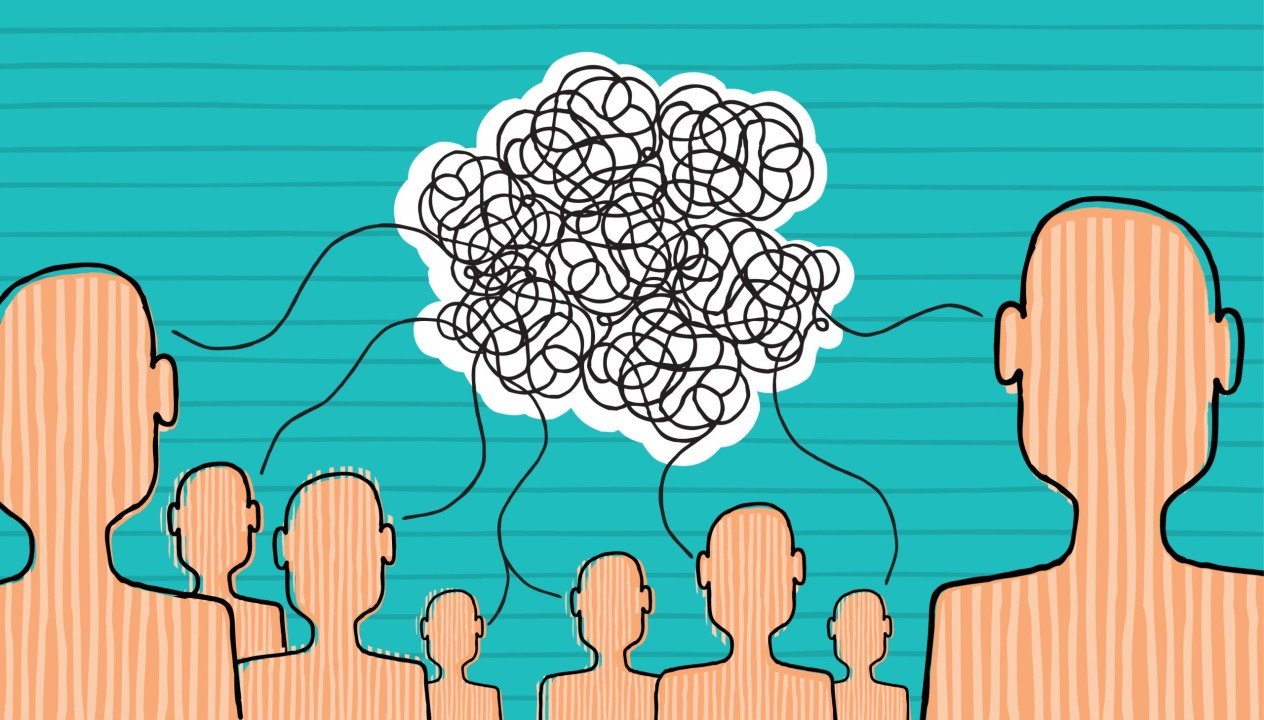I think to effect real change in the DEI space, we are going to need a two-pronged approach: legal solutions and a plan to shift cultural norms. Cultural change requires long-term vision and multiple strategies. Diversity training, when thoughtfully designed to address the needs of schools, universities, workplaces, and society at large, especially if it incorporates a visual component and is repeated over time has the potential to foster greater collective harmony. It can serve as a vital tool for advancing pluralism. Let’s approach diversity training with an open mind, recognising that it is a work in progress. While it may never be the most exciting endeavor, its impact could be profound.
The magic recipe
I believe documentary films can serve as powerful agents of change. A compelling story, well-told with a strong visual component, can provide a positive and accurate representation of a social group. When such films are viewed repeatedly over time, they become pleasant, accessible, and memorable, qualities that align with effective diversity training. One-off diversity training sessions alone cannot address the complexities of a fragmented society or the challenges of diversity. While no single approach is perfect, documentaries can play a vital role in helping us confront and make peace with the unfamiliar and uncomfortable parts of ourselves.
Social constraints
Race may be a social construct, but racism is a very real system. If we think of racism as a system, it becomes clear that its operation doesn’t depend on who is in charge. Whether the hands steering it are Black, brown, or white, the system continues to function as designed. In the West, the individual successes of middle-class Black people are almost always deeply connected to the collective struggles and advances made by working-class Black communities. Yet, paradoxically, it is often the working-class Black individuals who see the least benefit from these advances.
““There is an understanding of diversity as the difference that brings no difference and the change that brings no change.””
Fighting the war within
Everyone is fighting an internal battle, whether it’s in their relationships, mental health, or finances. That’s why showing a little more compassion every day is so important as we rarely know what others are going through. It’s easy to be critical or judgmental, especially when someone has different political views, opinions, or even behaves rudely. I think choosing kindness may make a bigger difference than we realise.
““Do not assume you’re smarter simply because you’re older.” ”
The hard work starts now
Diversity, Equity, and Inclusion (DEI) initiatives are deeply rooted in principles of change management and organisational development, providing a structural framework for implementing systemic and lasting change. I think working in the DEI space can be emotionally demanding, requiring self-awareness and self-care to prevent burnout. DEI practitioners must remain introspective, recognise their limits, and prioritise their well-being to sustain their efforts. Additionally, expertise in DEI often stems from hands-on experience and a process of trial and error. Many traditional approaches and frameworks are not formally documented, highlighting the importance of continuous learning and adaptability.
Moving the needle
I work with leaders and senior executives to help them effectively lead employees from marginalized and underrepresented backgrounds. My approach is not about quick fixes or performances, it's about authenticity, connection, and transformation. For as long as I can remember, I’ve been deeply curious about people. This curiosity has shaped my career in learning and development, from consulting on DEI initiatives to coaching leaders. My goal has always been to create meaningful impact.
As a coach, I provide a safe space for leaders to take off their masks and share what’s truly on their minds,without fear of judgment. It’s in these honest conversations that real growth happens. If you’re ready to deepen your understanding, embrace inclusion, and create a workplace where every team member feels seen and valued, let’s talk. Contact me via email for a confidential meeting. Together, we can build stronger, more connected teams and lead the change that matters.
Kindness is the answer
My goal is to work with leaders and senior executives, helping them lead employees from marginalised and underrepresented backgrounds. Curiosity about people has shaped my life, and I create deep connections because I care about learning and understanding the people I work with. I’ve been fortunate to work in learning and development, consulting, implementing DEI initiatives, and coaching. I create a safe space where individuals can remove their masks, speak from the heart, and trust that I will never judge them. Contact me via email for a confidential meeting.
Supporting skills
Human beings naturally seek to understand their social status in relation to others. I think acknowledgement and recognition are powerful tools for enhancing status and fostering supportive behaviour. However, when people are uncertain about what to expect, they tend to become defensive. To create a sense of safety, it’s important to provide clarity about what they will experience. When coaching, understanding my own behavioural patterns helps me relate more effectively to my clients.
Opportunity gives courage
Success often requires taking risks, even when failure is a possibility. Think of an entrepreneur launching a new product: they risk financial loss but also open the door to innovation and market breakthroughs. In a corporate setting, a leader encouraging their team to test bold ideas - knowing some may fail - builds a culture of creativity and resilience. True success isn’t just about avoiding failure; it’s about embracing the lessons it brings and using them to grow stronger.
Building trust
While offering help shows generosity, asking for help fosters deeper trust because it reveals vulnerability and invites collaboration. For instance, a manager who admits they need input on a challenging project gives their team a chance to contribute, making them feel valued and trusted. Similarly, asking a colleague for advice on solving a problem strengthens the bond between you, as it shows respect for their expertise. Trust thrives in these moments of mutual exchange, creating a stronger sense of connection and teamwork. I think we don’t build trust by offering help; we build trust by asking for help.
Common sense and genius
““Two things that seldom seem to go together are genius and common sense. When I try to think of people with both, the first name that comes to mind is Milton Friedman. But it is a struggle to try to come up with more names after that.””
Embrace contradictions
Human psychology is full of intriguing contradictions, often described as "unions of opposites." Robert Cialdini, in his book Influence, highlights how these opposites can be remarkably effective in persuasion. For example, we’re drawn to products that “everyone has,” associating popularity with quality, yet exclusivity - “only a few have this”- can evoke just as powerful a desire. Similar dynamics emerge with scarcity versus abundance, where the urgency of “act now, it’s almost gone!” contrasts with the reassurance of “there’s more than enough for everyone,” and with familiarity versus novelty, as in “this is a trusted classic” versus “discover something new and unique.” Beyond persuasion, these contradictions extend to the value we find in processes versus outcomes. Certain experiences gain meaning not from the result but from being savoured slowly and thoughtfully, where the journey itself becomes more significant than the destination.
Consistent narratives
c/o Adobe
Marketing is about crafting a story that resonates with the right audience, one so compelling that they feel inspired to share it, building trust and a reputation for what you stand for. Too often, marketers default to creating average solutions for average people, leading to a race to the bottom. Instead, we should focus on meaningful engagement, investing resources in systems that align with our goals. While authenticity and personal connections can feel overwhelming to execute consistently, I think what people truly value is consistency and transparency. These qualities foster trust, ensuring your story endures and spreads naturally.
Everyone is capable of being toxic
There is a difference between emotional invalidation and gaslighting. Gaslighting is a form of psychological manipulation where someone intentionally causes another person to doubt their feelings, memories, or perception of reality. The goal is often to control or undermine the other person. For example, a gaslighter might say, “You’re imagining things” or “You’re too sensitive” to dismiss valid concerns. In contrast, emotional invalidation happens when someone dismisses or minimises your feelings, often shifting the focus away from your concerns. While this behaviour can be hurtful or defensive, it isn’t necessarily gaslighting unless there’s a pattern of making you question the legitimacy of your emotions or reality.
Myth busters
Here are three key myths busted:
Coaching is about growth and performance, not problem-solving. It’s designed to help you reach your potential, not to address issues.
Coaching is often mistaken for consulting or mentoring. The difference is in the approach: consulting and mentoring rely on external expertise, while coaching helps you tap into your own insights as the expert in your journey.
Coaching is confidential, even when it's sponsored by your employer.
Trust your instinct
I help individuals develop a success-oriented mindset. I think by trusting your instincts and leveraging the power of storytelling, you can highlight the unique story that sets your business apart. Focus on solving meaningful problems as this is the foundation of true impact. Remember, understanding the difference between being right and achieving success is key to long-term growth.
“We don’t build trust by offering help, we build trust by asking for it.”
Let's have a meeting
I work with C-suite executives, business owners, and senior managers to unlock their full potential. I think meaningful change starts with transforming the way we think. To act differently and develop new behaviours, we first need to shift our thoughts. Rather than teaching new skills, I help my clients recognise and leverage the abilities they already possess. By gaining new perspectives, they can use these skills in more effective ways. My approach focuses on enhancing self-awareness, clarifying goals, and developing leadership and management skills, equipping my clients with the tools to solve their challenges confidently and effectively.
Interested? Contact me via email and let’s have a meeting.
London baby
10 things that require discipline, not talent:
• Consistent sleep routines
• Eating healthier
• Honesty
• Journaling
• Kindness
• Laughing out loud
• Playing
• Reading
• Saying ‘please and thank you’
• Spending time in nature
• Staying in touch with friends
Everyone can be better
The core model of coaching focuses on raising awareness and setting clear, positive goals. To do this effectively, it is crucial to establish a genuine connection with the client, demonstrating care for both the client and the process we are engaged in. A key responsibility of the coach is to help the client gain clarity—about what they want, their current situation, their goals, and the factors that will support them throughout the process. Curiosity is a powerful motivator for a coach; being genuinely curious about the client’s journey enhances your ability to guide and support them effectively.
Challenging the client’s thoughts and holding them accountable as they make progress is also essential. Confidence in the coaching process, belief in the client’s potential, and a guarantee of confidentiality are all critical to a successful coaching relationship. Both the coach and the client must be committed to the process and the desired outcomes. With this foundation, not only can clear goals be set, but they can also be achieved.
Beyond survival
Purpose isn’t a destination you stumble upon; it’s a commitment you cultivate every day. We have to identify what brings meaning to our lives and take purposeful steps consistently. By becoming more purpose-driven, we shape our thoughts, feelings, and actions in alignment with our goals. After all, our actions only change when our thoughts transform, as thinking inspires feeling, and feeling propels action.
Remember, you don’t find your life’s purpose - you create it. If you haven’t yet discovered your passion, your purpose is to explore and unveil it. Lacking an innate sense of direction doesn’t mean you’re without purpose. Instead, it signals that your journey of self-discovery is a vital part of your mission. Embrace the challenge, and find joy in uncovering who you’re meant to become. I think your purpose won’t be handed to you or dictated by others; it’s cultivated from within, nurtured by your actions and decisions.





















